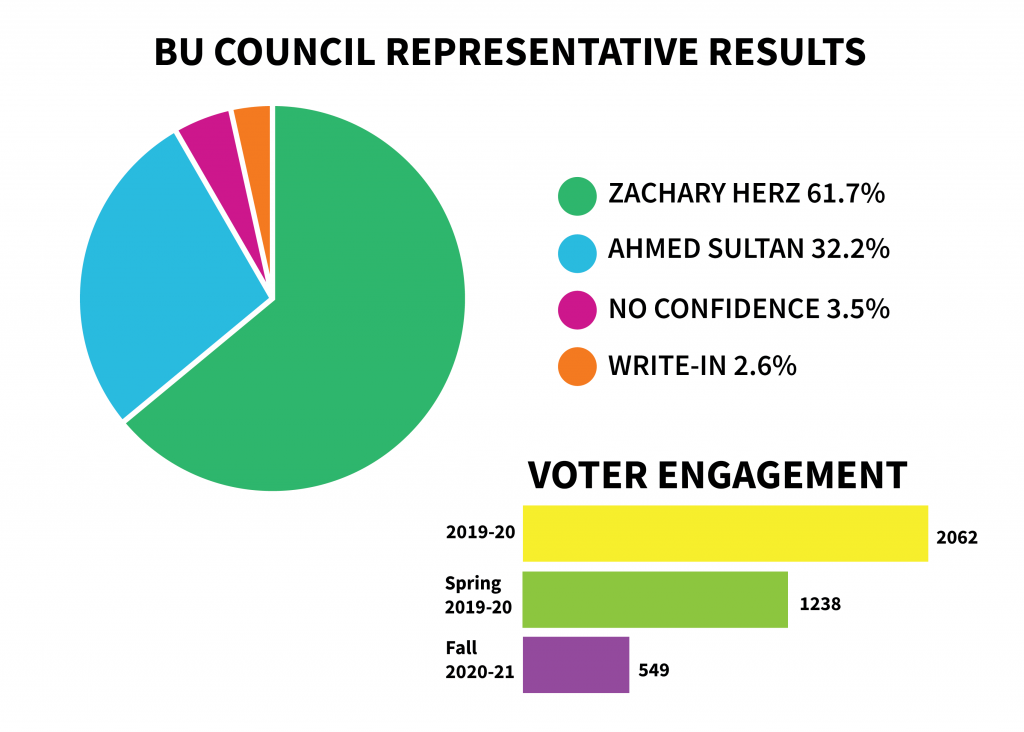
Following the resignation of Willa Scolari, a junior majoring in psychology, a special election for Binghamton University Council representative position was held on Monday.
The vacant position was contested between two candidates: Zachary Herz, a senior majoring in psychology, and Ahmed Sultan, an undeclared freshman. Herz won the election with 61.7 percent of the votes. After the victory, Herz expressed his gratitude for those who helped get him elected and shared his eagerness to get started.
“I am super motivated to get to work with the [BU Council] as well as school administration in tackling many of the issues that I discussed in my platform,” Herz said. “The position itself is very broad and is what you choose to make of it. That being said, I am excited to advocate for all students and be vocal on the issues that are pressing to the students of [BU]. I am looking forward to reaching out to students and student groups to get more ideas for issues so that I can make sure to accurately represent the entire [BU] community.”
Sultan followed, securing 32.2 percent of the vote. 3.5 percent of the vote were votes of no confidence, and 2.6 percent of votes were write-in votes. This election represents a fraction of BU students, with 549 students voting in this special election. In March 2020, 1,238 students voted in the regularly scheduled SA elections and in March 2019, 2,062 students voted.
On Oct. 12, the Student Association (SA) held the special election between 9:00 a.m. and 9:00 p.m. over B-Engaged. During an SA meeting on Oct. 13, the SA Student Congress confirmed Herz’s victory with 27 votes in favor of Herz’s confirmation, one vote against and zero votes abstaining.
In addition to low voter turnout, the election also faced organizational flaws. Students were supposed to rank their preferred candidates, with their top choice ranked as number one and their last choice ranked as number four. According to Megan Fey, chair of the SA Elections and Judiciary Committee and a senior majoring in biochemistry, this format proved to be confusing for students, as many accidentally voted backward. Several student voters reached out to her with their concerns.
“I personally received two emails and a few texts from committee members,” Fey said. “But [Sultan] reached out saying he got many more, and I also had roommates who didn’t understand how the voting worked, leading me to believe it was a common problem amongst all voters that needs to be addressed for the next election.”
To combat the issue, Fey hopes to change the voting system by eliminating rank-order voting when there are less than three candidates. However, Fey confirmed that student confusion over ranked voting did not crucially impact the results of the election with Herz still winning the majority of the votes when combining the votes that cast Sultan as one and four.
Students also had other concerns regarding the election. Jackson Hengsterman, an undeclared sophomore, expressed worry over the fact that students were given 12 hours to vote.
“I feel like there should be more than 12 hours allocated for such a consequential position, especially when students are receiving so many emails that they may not be able to view everything right away,” Hengsterman said. “I personally wasn’t able to vote because I didn’t see the email until it was too late.”
Hengsterman was not alone in missing the voting period. Mary Sanchez, a sophomore majoring in biology, expressed similar thoughts.
“I didn’t know voting already happened,” Sanchez said. “But I would have voted for [Herz] based on his coronavirus safety platform if I had known.”



